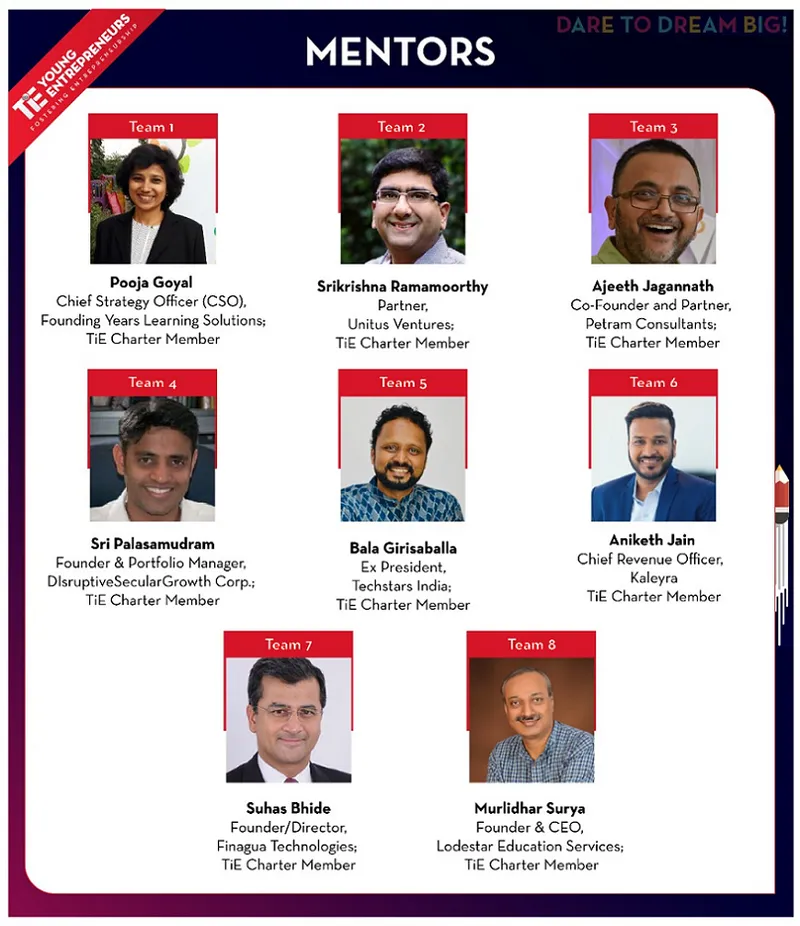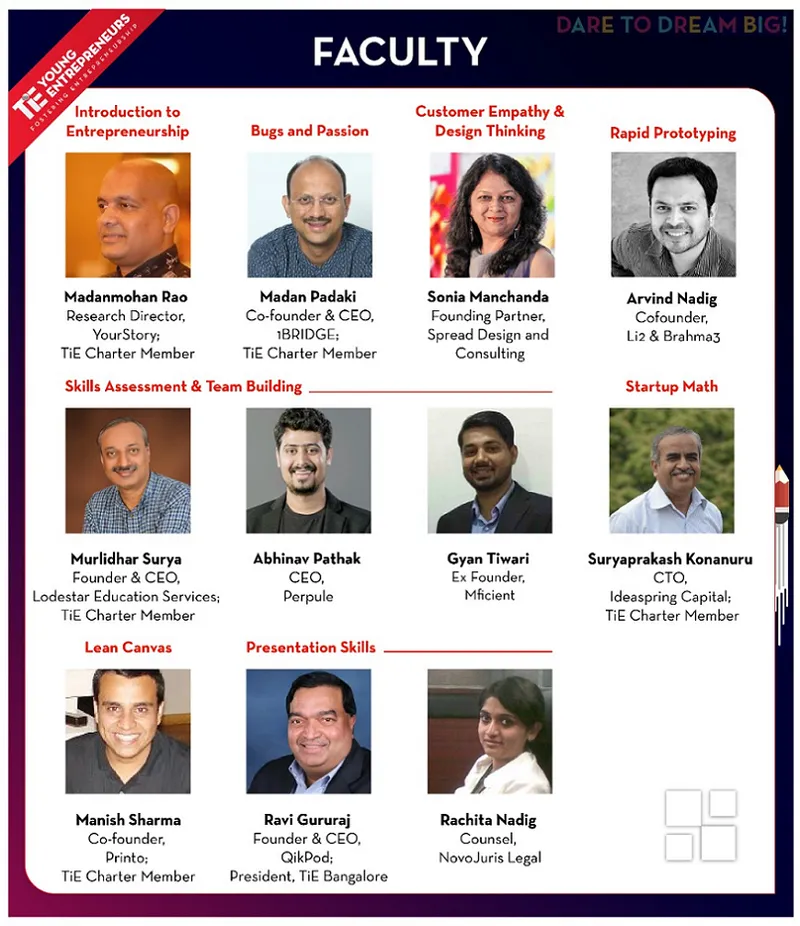How entrepreneurship is taught to school students: TiE Young Entrepreneurs wraps up fourth annual Bengaluru batch
For the fourth time, TiE Bangalore has conducted an educational programme on entrepreneurship for school students. Here’s how they learn and compete with teams from 30 cities around the world.
The TiE Young Entrepreneurs (TYE) is a global programme run by chapters of entrepreneurship network TiE (The Indus Entrepreneurs) for high school students (Classes 9-12). TiE also runs another programme for college students, called TiE University (earlier called TISC, or TiE Startup Challenge).

Organised by the TiE Bangalore chapter, TYE Bangalore programme's workshops, mentoring, and pitching sessions are all being conducted online this year due to the coronavirus pandemic. See Part I and Part II of YourStory’s coverage of TYE 2019. This year, YourStory is participating as a workshop leader and juror.
TYE was launched in 2008, and 30 chapters ran it in 2020. TiE University kicked off in 2012, and 18 chapters ran the programme this year. The TiE Women programme was launched in 2019, and 26 chapters around the world are running it in 2020.
This year, due to the coronavirus pandemic, many TYE programmes are being conducted entirely online. See also our earlier profiles of resilience activities by TiE Bangalore, TiE Global, TiE Silicon Valley, TiE Pune, TiE Kerala, TiE Hyderabad, and TiE Kolkata.
TYE helps students learn about entrepreneurship through research, ideation, problem definition, customer interaction, prototyping, and pitching. The Bengaluru programme is now graduating its fourth batch of 46 students from 36 schools across seven cities, culminating in a pitch competition this weekend.
The TYE Bangalore jurors this year are from Ideaspring Capital, Multiversal, Dhiyo.ai, Mouser Electronics, Again Drinks, and YourStory. Winners in successive rounds from 30 cities get to compete at the TYE Global Finals for cash prizes up to $10,000 and global recognition.
In this write-up, we cover the curriculum topics, feedback from instructors and mentors, and recommendations on how this initiative can be scaled further. This would involve active participation from schools, parents, government, corporates, and startups.
The programme takes on even more significance in light of the planned overhaul of India’s education system. The New Education Policy aims to make education more holistic, integrated, learner-centred, multi-disciplinary, and flexible.

The TYE Story
TYE was originally started in Boston in 2005 by Geetha Ramamurthy, who was Executive Director at TiE Boston at the time. She now runs the GiGa Innovation Centre in Bengaluru and the US.
At the age of 15, her son asked her about what resources were available for him to learn entrepreneurship, kicking off a journey which led to the creation of the TYE programme. It was later scaled up as the TYE Global programme.
TYE Bengaluru 2020
The TYE Global Handbook outlines the curriculum and principles of the programme. Workshop topics for Phase 1 in Bengaluru were conducted by TiE Bangalore charter members and entrepreneurs. Phase 2 consisted of problem identification, customer interaction, prototyping, and pitching, with active support from mentors.
Topics and speakers were Bugs and Passion (Madan Padaki, 1BRIDGE), Customer Empathy and Design Thinking (Sonia Manchanda, Spread Design), Rapid Prototyping (Arvind Nadig, Li2), Skills and Teams (Murlidhar Surya (LES), Startup Math (Suryaprakash Konanuru, Ideaspring Capital), Lean Canvas (Manish Sharma, Printo), and Presentation Skills (Ravi Gururaj, QikPod; Rachita Nadig, NovoJuris Legal).
Mentors for Phase 2 were Ajeeth Jagannath (Petram Consultants), Aniketh Jain (Kaleyra), Bala Girisaballa (ex-Techstars India), Murlidhar Surya (LES), Pooja Goyal (Founding Years Learning Solutions), Srikrishna Ramamoorthy (Unitus Ventures), Sri Palasamudram (DisruptiveSecularGrowth), and Suhas Bhide (Finagua Technologies).

Entrepreneurship in the coronavirus era
“Entrepreneurship has a lot to do with starting off with an uncertain plan, working with uncertain resources to reach (an uncertain) certainty,” explains Manish Sharma of Printo, in a chat with YourStory.
“It is remarkably similar to dealing with a crisis like the current pandemic where the best of plans are undone and new second order effects unfold each week. In such situations, the ability to deal with new data and new situations is a coveted asset,” he adds.
“With a new normal, most business are looking for people who are self-starters and risk takers – both are basically entrepreneurial skills. Also, many business models will change. Hence, having an entrepreneurial mindset will be very valuable,” emphasises Murlidhar Suryanarayan of Lodestar Education Services, who taught team building, recruitment, diversity, and skilling.
“With people having lost jobs, this is a great time to be pushed against the wall to learn how to start a business,” observes Ajeeth Jagannath of Petram Consultants, who mentored students on how to put together a business idea and plan, along with market validation and digital outreach. However, such job challenges are not faced by the current students.
“The pandemic challenges the status quo. We don’t know what the new normal will look like, so it really brings out our creative and entrepreneurial skills,” observes Bala Girisaballa.
“Having an entrepreneurial mindset helps people solve the problems facing the community, particularly during times of crisis,” explains Sri Palasamudram of DisruptiveSecularGrowth. He also mentored students on how to choose an idea and create the presentation.
“Entrepreneurship skills apply beyond periods like the pandemic. It is a mindset of solving problems, bringing other people along in that quest, deal with ambiguity, and creating structure out of chaos,” says Pooja Goyal of Founding Years Learning Solutions, who mentored students on business plans and entrepreneurial mindsets.
Entrepreneurship entails a systematic approach that every professional will need if they have to survive and thrive. “This is regardless of whether you start a business, take up a corporate job, or do social service,” she adds.

TYE session (1)
Virtual learning and mentoring
Moving the entire TYE programme opened up a host of roadblocks – as well as opportunities. “Online interaction had many challenges, topmost being the inability to pull in quieter participants,” Manish Sharma observes.
“The advantage is that distraction is not infectious in an online classroom, if the facilitator can keep the focus. Storytelling is even more important in such a context, as early but sustained engagement is needed,” he adds. He explains that next time, he would conduct each session as a story narration, part of which is crafted by the participants.
“Getting the students to interact with each other and form groups so that they experience how to put together and manage a team was really challenging. But it was fun as well because of the energy and enthusiasm of the students, and their inherent ease and familiarity with the online medium,” observes Murlidhar Suryanarayan.
“It was not difficult to interact online, although every call was exposed to the vagaries of telco signal strength,” says Ajeeth Jagannath. It would help to teach students how to collaborate online, though not having a whiteboard can be a challenge.
“Students are comfortable with the online medium anyway, and the pandemic accelerated this even more. The online experience was seamless,” says Bala Girisaballa. But one challenge is lack of the kind of interactions normally possible in an actual room.
“Children are very comfortable with the online medium. It worked because they were pretty diligent and committed,” Pooja Goyal adds.
“I was a bit nervous about engaging a young group online for four hours. But all of them were so engaged that it didn’t feel that we were all in a virtual space,” observes Madan Padaki of 1Bridge. He explained the concept of ‘mass entrepreneurship’ and how to come up with effective solutions after identifying the root cause of the problem.
“Surprisingly, it was not at all difficult to teach online,” observes Suryaprakash Konanuru of Ideaspring Capital. He taught revenue and profitability aspects of business, along with cashflow and product-market fit.
“The advantage was that they were individually focused and not distracted by their peers. But it was a bit difficult to guide the group activity as one has to move from one virtual room to another. This is way easier to do in person,” he adds.
“Students should be given guidelines on what tools and infrastructure to use. On occasion, they would not participate on time. It would help to show them how to collaborate effectively, with examples as simple as using a calendar invite,” Sri Palasamudram adds.

TYE session (2)
Challenges and advantages
It can be tough, but is still important to teach school students about entrepreneurship without real-world business experience. "The limitation is that one can only teach so much – one has to execute the business plan, where the real learning occurs,” Ajeeth Jagannath explains. Fortunately, his students were able to get insights by speaking to quite a few people in the industry.
“The advantages is that students learn there is another ‘avenue’ or career path. If they really get excited, then they may explore a more business education track and get into starting their own companies at much younger ages,” he adds. This is very beneficial from a risk perspective.
“They are new to it, it is understandable - however, we need to give them lot more guidance,” Sri Palasamudram advises. For instance, his team kept changing their project idea till right before the last date.
“They need to be given timelines when each of the functions must finish. For creating presentations, we need to give them templates and a library of tools so they can be more productive,” he adds.
“Overall, it is a good idea to get them thinking about solving problems. This is a must for any nation or a community,” he emphasises.
“It was difficult for some students to connect the theory from the sessions to actual applications. It took a lot of handholding to get them to understand about markets, customer experience, and so on,” observes Bala Girisaballa.
“Students lack business experience and don’t know much about what happens in a business, let alone how to run it. It is hard to connect to the experience, but they pick up fast. Entrepreneurship should be taught as a subject for school students, not just as a project,” he adds.
“Many aspects of entrepreneurship are difficult to pick up as students require life experience. Their idea of diversity in background or culture is limited,” says Murlidhar Suryanarayan.
“While we can cover many topics in such a program, many need practice tor them to learn, such as making a business plan. Becoming aware is only a start, they have to learn to do it,” he adds.
“But the students are very enthusiastic, they have an open and fearless mind. Hence, their ideas are fresh. They have no baggage – so hopefully they will absorb the inputs and go out and build a brave new world,” he enthuses.
“As many of them are not exposed to businesses, we have to give them examples from real life and use them to explain the concepts initially. But many of them were quick to grasp and use it in the activities during the class,” says Suryaprakash Konanuru.
“The advantage of teaching them early is that they would be better prepared when they launch their own startups. They would be more pragmatic than just passionate, which helps drive the success rate,” he adds.

TYE session (3)
Feedback from students
All faculty were generally pleased with the student reactions. “I sensed enthusiasm - in every call I had with the students. They were also very receptive to my suggestions. But I felt they need to learn to manage their time better as they kept missing internal deadlines I set for them,” observes Ajeeth Jagannath.
“They were eager to learn, they felt that my topic was completely new and they were not at all aware of the importance or criticality of forming a team. They appreciated that a good team is core or crucial to the success of any organisation,” Murlidhar Suryanarayan observes.
“They seem to want to do it, but kind of got lost in some areas,” Sri Palasamudram adds. “The students were energetic and enthusiastic. They were so keen to learn, and came up with lots of ideas,” Bala Girisaballa says.
“The students wanted more time for debating and for activities. We had to finish the class in a bit of hurry as we were going beyond the stipulated four hours. It promptly was mentioned in the feedback,” Suryaprakash Konanuru jokes.
Benefits for instructors and mentors
Leading the programme topics helps instructors and mentors as well, in multiple ways. It gives a sense of enjoyment and satisfaction, and increases depth of understanding.
“Interacting with the next generation is fun, and helps understand them better. I had to think of examples which they would be familiar with to explain the concepts,” Suryaprakash Konanuru says.
“Overall, it helps me feel younger. Hopefully, we will do it in person next time and make it even more interactive,” he enthuses.
“It is always great to listen to new business ideas and to see them take shape,” Ajeeth Jagannath observes. Sri Palasamudram says he benefited socially from the interactions. “This is a foundation we need to lay down,” he adds.
“I get to understand the mindset of this young generation, what they value, and what they want to pick up,” Bala Girisaballa says. “I loved interacting with the children. It is inspiring to see their maturity of thought, energy, and diligent effort,” Pooja Goyal adds.
“Interacting with young minds is always refreshing and one always learns something new. It helped me realise the potential that smart high-schoolers have and what we could do if we guide them adequately,” says Murlidhar Suryanarayan. Next time, he would like to enhance the teamwork component, and bring in a more innovative team activity.

Recommendations to TiE
The faculty offer a range of tips to TiE Bangalore to enhance the programme. “It would be good to alternate theory and practice more early, instead of teaching lots of theory and concepts first and only then applying them,” Bala Girisaballa advises.
“The students forget earlier concepts when it comes to applying them. We need to make the experience real in their minds,” he adds.
“I hope TYE provides them an opportunity and framework to provide feedback to other members of the team. That will be hugely valuable to them,” Pooja Goyal says.
“It would help to identify a couple of ideas or projects that can be used throughout the course and beyond,” Suryaprakash Konanuru says. “Have a learning outcome defined for each session, and test students on it,” Murlidhar Suryanarayan adds.
“Focus on university students who can actually be mentored to start a real business coming out of college,” advises Ajeeth Jagannath. “Our entrepreneurs at TiE can be super role models for every young person. These stories are waiting to be told,” says Madan Padaki.
The role of schools and parents
Ultimately, parents and schools will continue to play a major role in student careers. “I believe parents and schools should encourage entrepreneurship. I understand it's not for everyone and depends on lots of factors. But we should help prepare them for entrepreneurship, as it helps in handling their life better,” Suryaprakash Konanuru emphasies.
Even if they do not launch startups, they will appreciate the importance of risk taking, perseverance, handling money and resources, and the like. “Ideally, it prepares them to achieve the maximum in a constrained environment,” he adds.
“Many skills which are essential to entrepreneurship like initiative, taking risks, and working with people are also core skills for life. Hence, an exposure to a course in entrepreneurship or an entrepreneurial experience is a must for all students,” Murlidhar Suryanarayan urges.
“Do it. It gives kids a real experience and might get some of them hooked on to entrepreneurship early enough,” advises Ajeeth Jagannath.
“Entrepreneurs are value creators. We need schools to allow students to think on their own,” Bala Girisaballa advises.

Role of government and policy
Governments play a core foundational role in education systems. "Entrepreneurship should be taught, although at university level would be ideal. This way, some of the students can come out of college with a business plan and maybe even a prototype of an idea. They can continue to be nurtured at institutional incubators,” Ajeeth Jagannath recommends.
“They don't come out of the system looking for a job, rather they come of the system becoming job creators! This is also the right time for them to experiment and take risks,” he adds. He does not think entrepreneurship education should be done at schools - if so, it should be kept as a fun summer programme.
“It is a welcome move that NEP’s emphasis on final exams is reduced, and evaluation will be more continuous. Entrepreneurship should be a co-curricular activity, and not just an extra-curricular activity,” Bala Girisaballa advises.
“Cross-functional education should be promoted where students not only learn science and technology, but also a bit of finance and other topics. It would prepare students better for entrepreneurship,” Suryaprakash Konanuru suggests.
“There has been a good growth in terms of entrepreneurship cells across colleges. Government should go beyond mere encouragement of this,” he adds.
“I think the government is already doing a lot via its various entrepreneurship programmes. One area in which they can do more is to set up entrepreneurship centres or incubation centres in schools in smaller towns. They lack this input,” Murlidhar Suryanarayan observes.
Madan Padaki cites the example of the Delhi government’s experiment to embed an entrepreneurial mindset curriculum in every government school. “State governments should consider including these sorts of curriculum at every level,” he recommends.
“Governments should promote these problem-solving skills everywhere, so that people can solve the problems communities face. This will make for a better place here, and not just solving for, say, the US market,” Sri Palasamudram suggests.

Involvement of startups and corporates
The faculty urge corporates and startups to get on board as well. “Corporates as well as startups should take on board those graduates who have tried and failed in their attempts at business. These youngsters would have an entrepreneurial spirit and have real learnings that would be useful in the corporate world,” Ajeeth Jagannath advises.
Businesses should ideate more with students, share case studies, and offer office visits. “Corporates can also learn how to connect with youngsters,” Bala Girisaballa suggests. Startups can share their founder journeys as well.
“Businesses can offer sponsorships and internships. Even doing a consumer survey is a skill students have to learn – it would be great if they can experience how this is really done, and how to interact with and interview consumers,” Murlidhar Suryanarayan adds.
“Corporates can get their employees to volunteer to teach or guide some of these sessions. Hopefully, some of these learnings will rub off on them as well,” Madan Padaki says.
“Corporates can help in validation of student ideas. They can also offer sponsorship, and guide implementation of ideas,” Suryaprakash Konanuru suggests. Startups can talk about how they overcame challenges, and offer internships to students.

The road ahead
“Entrepreneurial mindsets is a critical 21st century skill. Just like mathematics, entrepreneurial thinking should be cultivated in each and every student – irrespective of whether they turn out to be entrepreneurs,” Madan Padaki urges.
A lot of entrepreneurial learning can happen by deeply observing daily life. “It is absolutely possible to be inspired by the journeys of the milkman, the paper-wallah, or neighbourhood grocery store owner,” he says.
Students exposed to this thinking at an early age tend to develop this “entrepreneurial muscle” better. “This exposure can come from guided conversations, projects and local role models,” Madan explains. He says he is amazed by the students’ emails after his session, with their intentions to make the world a better place by applying entrepreneurial thinking.
“The world of today and tomorrow is fast changing and the pace of change is ever increasing. I believe children need to build three kinds of skills,” Pooja Goyal sums up. They are cognitive skills (such as math, science, language), non-cognitive skills (like grit, resilience, growth mindset, curiosity), and meta-skills (learning how to learn, how the brain works).
“Our education system focuses primarily on cognitive skills. Development of non-cognitive skills is mostly a by-product, if at all a focus. Meta-skills are not even addressed,” she laments.
Programs such as TYE help with the development of all three of these skills. “In addition to learning the cognitive skills of making a business plan and a presentation, children develop the non-cognitive skills of collaboration, resilience, and creativity,” she explains.
“Most importantly, they learn a lot about themselves – what is their group interaction style, what are their strengths and weaknesses, and what is their preferred mode of functioning,” Pooja signs off.
(Edited by Teja Lele Desai)










